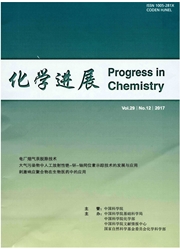

 中文摘要:
中文摘要:
模拟酶,或称人工酶,是一类利用有机化学方法合成的比天然酶简单的非蛋白质分子。随着纳米科学和超分子技术的发展,构筑具有生物催化功能的超分子模拟酶材料已经越来越成为科学研究和应用开发领域的热点。肽组装凝胶是以多肽为基本单元,在非共价力驱动下形成的一种新型超分子组装体,相比其他功能性材料,肽凝胶的结构及生物化学性质更接近天然酶,分子本身更利于修饰改造,且生物相容性好,这些特点令其在模拟酶方面具有独特优势。本文总结了近几年肽组装凝胶模拟酶在催化水解反应、Aldol反应和氧化还原反应中的最新研究进展,探讨了肽组装程度、微观结构、超分子结构、活性中心微环境以及pH对模拟酶活性的影响,介绍了肽凝胶模拟酶的应用领域,并对目前肽组装凝胶模拟酶研究中存在的问题与发展方向进行了分析和展望。
 英文摘要:
英文摘要:
Mimic enzyme, or artificail enzyme, is a kind of non-protein molecule which is synthesized by the organic chemical method. With the development of nanoscience and supramolecular technology, the establishment of supramolecular artificial enzyme with biocatalytic function has attracted increasingly attention in the field of scientific research and application development. Peptide-based gel is a new type of supramolecular assembly which is formed with polypeptides as the building block and driven by non-covalent forces. As a novel supramolecular material, the peptide-based gel exhibits unique advantages compared with other functional materials: the similar structural and biochemical properties to those of natural enzymes, easy to be modified and functionalized, and the good biocompatibility. These properties make peptide-based gel a ideal material to construct artificial enzyme. In this review, we summarize the characteristics of artificial enzyme based on the assembling peptide gel and introduce the recent research progress of it as the catalysts in hydrolysis, Aldol and redox reactions. The main factors which influence the catalytic activity, such as the assembly de~ree, structure.active-site microenvironment and pH, are also discussed. Some examples are provided to illustrate the protential application of peptide-based artificial enzyme. Finally, the problems and prospective tendency are presented.
 同期刊论文项目
同期刊论文项目
 同项目期刊论文
同项目期刊论文
 Preparation of Molecular Imprinted Photonic Crystal Sensor and ItsApplication in Determination of Ph
Preparation of Molecular Imprinted Photonic Crystal Sensor and ItsApplication in Determination of Ph An effective and green method for the extraction and purification of aglycone isoflavones from soybe
An effective and green method for the extraction and purification of aglycone isoflavones from soybe Preparation and Thermal Kinetic Deactivation of Cross-linked Enzyme Aggregates of Penicillin Acylase
Preparation and Thermal Kinetic Deactivation of Cross-linked Enzyme Aggregates of Penicillin Acylase 期刊信息
期刊信息
